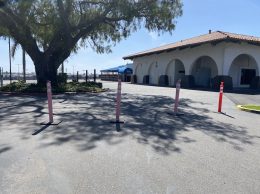North American Oil & Gas Corp., a small-time oil and gas company based in Ventura, is barely staying afloat.
Since the company’s formation in 2010, NAMG hasn’t produced any revenue and sold it’s only drilled well to a Colorado-based company for a 0.5 percent royalty of any commercial production.
However, according to the company’s recent quarterly securities filings, NAMG has insufficient funds for operations and is surviving on the proceeds from various convertible notes and equity issuances to “maintain itself as a viable entity and meets its general and administrative operations through Dec. 31, 2015.” Currently, the company only has enough cash to make it through May.
The Business Times previously reported the company was on the rocks in November of last year and had been relying mainly on borrowings, sales of its common stock and advances from a related party for the last two years. Since then the company’s debt has increased from $2.7 million to about $3.3 million.
The company maintains that it is in the early stages of exploration, but that capital raising through investors and or farm-out and asset sale agreements will be required to move forward on capital projects.
NAMG owns lease interests located in the Southern San Joaquin Basin covering its three prospects. On the Tejon Ranch Main lease, the company holds 290 gross acres and 270 net acres; on the Tejon Ranch Extension lease, the company holds 629 gross acres and 346 net acres; and on the White Wolf leases, the company holds 1,169 gross acres and 741 net acres. The majority of these leaseholds are held for primary terms of five years. The current leaseholds are set to expire over various periods from now until Feb. 26, 2018 if no additional lease terms are negotiated or extended.
According to NAMG’s securities filings, the company wants to set up two drilling operations, one in the Tejon Ranch main oilfield and another in the Tejon Ranch extension. The estimated cost to do so is about $3.5 million. The company is looking for outside funding through loans, partner agreements and all other capital sources at their disposal, but due the the dramatic drop in oil prices financing from any source is uncertain.
At current prices, secondary and tertiary recovery, or the recovery accomplished by injecting chemicals, gas or water into a reservoir to replace produced fluids, and thus maintain or increase the reservoir pressure, is financially more challenging and has impacted the company’s operations and ability to fund its exploration activities in California, the company said.
Since last August the company’s shares, which trade as a penny stock on the OTC Market, have dropped more 90 percent.






 Print
Print Email
Email

















